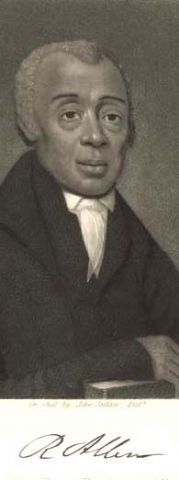
The man who owned Allen’s family was not a Christian, but Allen, his mother, brother, and sister all were. They persuaded the owner to let them attend church service. Allen says, “Our neighbours, seeing that our master indulged us with the privilege of attending meeting once in two weeks, said that Stokeley’s negroes would soon ruin him; and so my brother and myself held a council together that we would attend more faithfully to our master’s business, so that it should not be said that religion made us worse servants, we would work night and day to get our crops forward, so that they should be disappointed.” And so they did, working harder and attending more church services, disappointing the neighbors by their success. “At length our master said he was convinced that religion made slaves better and not worse, and often boasted of his slaves for their honesty and industry.” No doubt a slave-holder would be glad for any religious mythology that would keep his slaves obedient and industrious. He took Christianity that seriously, and no more.
But Allen knew that the gospel was about more than keeping order in an unjust social system, and having earned a hearing, he pressed his advantage. “Some time after I asked him if I might ask the preachers to come and preach at his house.” That was the beginning of the end: Stokeley consented, and Methodist preachers began bringing their message to his farm.
Preaching continued for some months; at length Freeborn Garrison preached from these words, “Thou art weighed in the balance, and art found wanting.” In pointing out and weighing the different characters, and among the rest weighed the slave-holders, my master believed himself to be one of that number, and after that he could not be satisfied to hold slaves, believing it to be wrong. And after that he proposed to me and my brother buying our times…
The word of God found its entrance and did its work: Thou art found wanting! After Allen became free, he began preaching and pastoring, eager to serve the cause of Christ and committed to the work of the Methodists whom he loved so much. His “gospel labors” were astonishing, as his black congregation was repeatedly moved to smaller rooms, less convenient times (5am!), and was even expelled from services in mid-prayer. When they began organizing for some independence as a congregation, so they could have their own building and reasonable worship times, a denominational official objected and, to Allen’s horror, “He told us we were not Methodists.”
Just as Allen had taken the gospel more seriously than American culture expected him to, he took Methodism more seriously than the Methodists.
Notwithstanding we had been so violently persecuted by the elder, we were in favour of being attached to the Methodist connexion; for I was confident that there was no religious sect or denomination would suit the capacity of the coloured people as well as the Methodist; for the plain and simple gospel suits best for any people, for the unlearned can understand, and the learned are sure to understand; and the reason that the Methodist is so successful in the awakening and conversion of the coloured people, the plain doctrine and having a good discipline. But in many cases the preachers would act to please their own fancy, without discipline, till some of them became such tyrants, and more especially to the coloured people. They would turn them out of society, giving them no trial, for the smallest offence, perhaps only hearsay. They would frequently, in meeting the class, impeach some of the members of whom they had heard an ill report, and turn them out, saying, “I have heard thus and thus of you, and you are no more a member of society”–without witnesses on either side.
In spite of current Methodist practice, Allen remained confident that Methodism was the right expression of Chrisitianity, and remained loyal and confident to its ideals:
The Methodists were the first people that brought glad tidings to the coloured people. I feel thankful that ever I heard a Methodist preach. We are beholden to the Methodists, under God, for the light of the Gospel we enjoy; for all other denominations preached so high-flown that we were not able to comprehend their doctrine. Sure am I that reading sermons will never prove so beneficial to the coloured people as spiritual or extempore preaching. I am well convinced that the Methodist has proved beneficial to thousands and ten times thousands. It is to be awfully feared that the simplicity of the Gospel that was among them fifty years ago, and that they conform more to the world and the fashions thereof, they would fare very little better than the people of the world. The discipline is altered considerably from what it was. We would ask for the good old way, and desire to walk therein.
The rest of the works of Bishop Allen, are they not written in his autobiography? He founded a denomination and a church which they named Bethel. Allen wrote out his rich theology of the God of Bethel in this hymn:
The God of Bethel heard her cries,
He let his power be seen;
He stop’d the proud oppressors frown,
And proved himself a King.Thou sav’d them in the trying hour,
Ministers and councils joined
And all stood ready to retain
That helpless church of thine.Bethel surrounded by her foes,
But not yet in despair,
Christ heard her supplicating cries;
The God of Bethel heard.